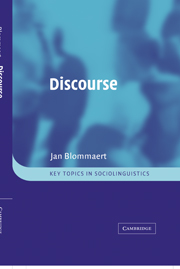Book contents
- Frontmatter
- Contents
- Preface
- Acknowledgments
- 1 Introduction
- 2 Critical Discourse Analysis
- 3 Text and context
- 4 Language and inequality
- 5 Choice and determination
- 6 History and process
- 7 Ideology
- 8 Identity
- 9 Conclusion: Discourse and the social sciences
- Notes
- Appendix: English translations of the documents in chapter 5
- Glossary
- References
- Index
2 - Critical Discourse Analysis
Published online by Cambridge University Press: 02 December 2009
- Frontmatter
- Contents
- Preface
- Acknowledgments
- 1 Introduction
- 2 Critical Discourse Analysis
- 3 Text and context
- 4 Language and inequality
- 5 Choice and determination
- 6 History and process
- 7 Ideology
- 8 Identity
- 9 Conclusion: Discourse and the social sciences
- Notes
- Appendix: English translations of the documents in chapter 5
- Glossary
- References
- Index
Summary
Introduction
Critical Discourse Analysis (CDA) is undoubtedly the most visible ‘school’ in the field under scrutiny in this book. At the same time, it would be a mistake to see CDA as the only possible critical perspective on language in society. This chapter offers a discussion of the emergence and development of the ‘school’ of CDA, as well as a survey of its main areas of inquiry: political discourse, media, advertisement, ideology, racism, institutional discourse. I shall also offer a brief survey of the main theoretical and methodological assumptions in CDA, and a glimpse of its major theoretical and empirical shortcomings. These shortcomings will be addressed more fully in some of the chapters that follow.
An obvious warning to be extended at this point is that whenever we make reference to a ‘school’, we find ourselves on thin ice. People identified as ‘members’ of this school may not always perceive themselves as such, and many observers would emphasise the incoherence and internal contradictions in what I am presenting here as a more or less unified and streamlined movement. What we are facing when we talk about CDA is a group of leading scholars, each with a background of their own, who agree on certain principles of analysis, who agree to address similar issues, and who have developed some institutional tools for doing so.
- Type
- Chapter
- Information
- DiscourseA Critical Introduction, pp. 21 - 38Publisher: Cambridge University PressPrint publication year: 2005
- 1
- Cited by



